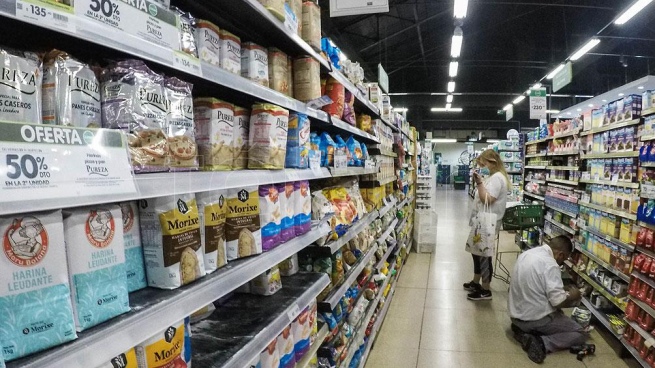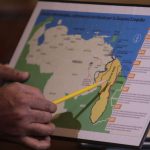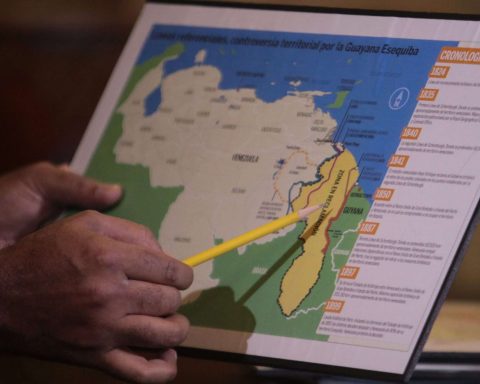The Government will launch “a series of measures” in the coming days with the aim of curbing inflation, especially the rise in food prices.
“The Government is committed to carrying out policies and measures that guarantee (that they do not rise) food prices,” indicated the spokeswoman for the Presidency, Gabriela Cerruti.
In his usual Thursday press conference at the Casa Rosada, he said that “In the next few days” the Government will announce a “series of measures” against inflationalthough “a miraculous plan” should not be expected to solve a problem that is “multi-causal”.
The official said that a “war” is being waged against the rise in prices that was already high in 2019 during the Macrista administration and worsened as a result of the coronavirus pandemic, and the war between Russia and Ukraine, she assured.
The official confirmed that “withholdings on grains are not going to be modified by the national government,” since such a change is “the power of Congress.”

Measures
“What the Government has defined is the decision to intervene” to “defend the rights of citizens”, in the face of the “unprecedented” increase registered in recent weeks in the international prices of commodities, among which are grains, oil and gashe specified.
Cerruti stressed that there will not be “a ten-point anti-inflationary plan, as has been announced so many times” in other times, but rather “a series of measures” will be announced in “the next few days”.
In addition, he stressed that the president has been meeting with the economic team to outline the measures and assured that “a general increase in withholdings” is not under study, but that there are “conversations with oil companies and other sectors” of the food industry to ” guarantee the price of flour and oil”.
“If this does not happen, there is the possibility of modifying the rate of products derived from soybeans,” said Cerruti, referring to the decision taken by the government last Sunday to suspend the registration of exports of soybean oil and flour.
Until the suspension, these derivatives were taxed at a rate of 31%, which could become 33% in the event that the incentives that the Executive Power ordered directly at the time are withdrawn.
The price issue added a new ingredient with the distribution of the basic food basket in February, which marked an increase of 9% compared to the previous month.
The international scene
On a global level, the International Monetary Fund (IMF) warned that food prices reached a new record in the wake of the war between Russia and Ukraineand that -in this framework- the sectors with fewer resources will be the most affected by the growing global inflation.
“Global food prices, which were already at record highs (a 23% increase last year), have reached new highs since the war in Ukraine began,” said Kristalina Georgieva, managing director of the IMF, through your Twitter account.
He added that “the poor who spend the most on food will be hit the hardest; the price shock will reverberate around the world and drive up inflation everywhere.”
The IMF measured the impact of food on the consumer price index of advanced and developing nations.
Based on the numbers reported by the IMF, while for advanced economies the share of food represents approximately 17% of the total index that measures consumer prices, for the poorest regions of Africa this item explains about 50 %, a more than eloquent fact that the rise in prices will be much more pronounced in the poorest countries.
Meanwhile, in Latin America, food prices represent about 23% of the basket, the agency specified, something that also brings to the table the strong impact it represents for the lower-income sectors.
Likewise, the Organization for Economic Cooperation and Development (OECD) pointed out that the war between Russia and Ukraine could “cast in doubt” the strong global economic rebound after the coronavirus pandemic, producing more inflation and lower growth.
According to the report from the Paris-based agency, global growth is estimated to be 1% lower than originally forecast (4.5%) as a result of the conflict with a “deep recession in Russia”, while inflation, previously high due to global supply problems, it would rise by an average of 2.5% worldwide.
“Global pressure on commodity supply is exacerbating the disruptions in supply chains caused by the pandemic, and is likely to affect consumers and businesses for a while,” said OECD Secretary-General Mathias Cormann in presenting the report. report.
For her part, the chief economist of the OECD, Laurence Boone, indicated that the war “is going to affect the world recovery and raise inflation” and that “government policy has a crucial role to play in restoring some of the certainties that we have lost.” .

The organization, which brings together 38 countries, recommended “monetary policies that anchor inflation expectations” and “temporary and targeted fiscal measures to cushion the impact on consumers and businesses,” which, if well designed, would add less pressure to the inflation.
Finally, he stressed the need to make “temporary monetary transfers aimed at the most vulnerable consumers to mitigate the rise in energy prices” that “can be financed, in some countries, through the collection of taxes on extraordinary profits” .
















